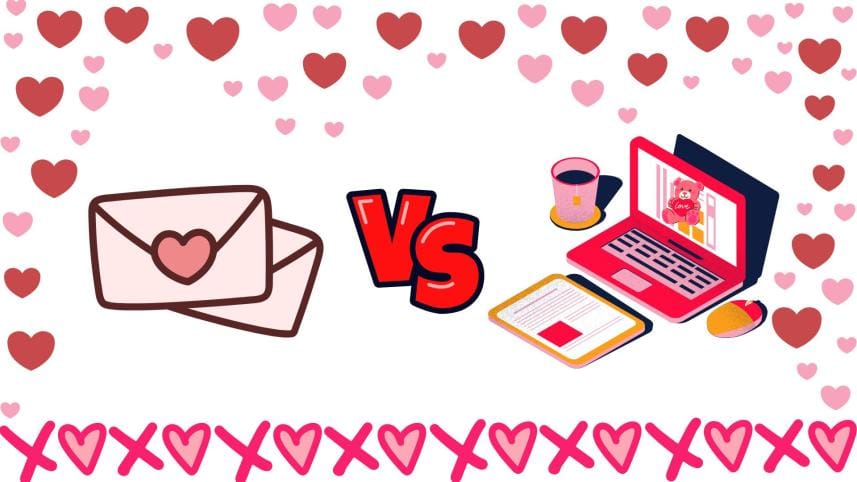Love ensnared by technology

"Science has given us speed but taken away our emotions," said Binoy Mukhopadhyay in his novel Dristipat, published six decades ago. Back then, he might not have envisioned how relevant his words would be today. In fact, what he said, now seems truer than ever. As our lives grow increasingly entwined with technology, it's as if the truth of his statement keeps becoming even more profound. As the digital age advances, emotions, including love, seem to be slipping away. The realm of romance, once dominated by deep emotions, is now falling victim to the relentless force of technology.
Love was once considered the highest form of emotion. Today we seem to lack emotions. True romantic connections no longer happen the way they once did. Love letters, once exchanged in the folds of books or the pages of notebooks, are no longer the mode of romantic communication. Now, it's Facebook friend requests, tags, likes, missed calls, or text messages. Handwritten letters are now a thing of the past. Today, it's all about short, snappy, and shallow love. Love no longer exists in the woods, the shadows, or beneath the banyan tree. Now, love lives on Facebook, WhatsApp, TikTok, Viber, Twitter, Skype, Line, WeChat, and even Google Plus. Forget flowers, chocolates, or jewelry; love now blooms in fast food chains, cafes, food courts, cinemas, or dimly lit restaurants. The good old rooftop date or the classic landline romance are now relics of history. Today, love is captured in iPhones, androids, and other smartphones.
Gone are the days when people exchanged letters via pigeons or wrote poetry for their beloved. Today, it's all about apps teaching the ABC of love. Want to send flowers, chocolates, or create a playlist of romantic songs? There's an app for that. Want to grab a meal together or go to a movie? You guessed it: there's an app for that too. Apps like Zomato, Book My Show, or Bollywood Hungama are the new "love services." Want to measure the depth of your love? There are apps like Love Calculator, Real Love Test, or Love Meter for that. Want to know the secret to success in love? Apps like High School Crush-First Love or How to Win Her Heart can help you navigate those tricky emotional waters. Technology and consumerism have turned love into a game of convenience, where emotions are often secondary.
It's shocking to think that characters like Rabindranath Tagore's Labonyo or Sarat Chandra Chattopadhyay's Parbati are now almost extinct. Historical love stories—Yusuf-Zulekha, Radha-Krishna, Shirin-Farhad, Laila-Majnu, Romeo-Juliet—now seem like distant fiction. Nobody writes poems like Banalata Sen anymore, nor do people sing Bangla song "Pakhir bashar moto duti chokh tomar" Instead, we now hear songs like "Desi chhori, deshi chhori, hayre teri figure" or "Tore piriter agune jole-purey holo monta chicken tandoori."
Today, nobody becomes a Devdas after a failed love affair. Nowadays heartbroken lovers no longer sing songs of despair but instead joke with their friends by singing "break-up" songs or arranging break-up parties. Such break-up parties have become a trend in recent years.
Moreover, dedication to love is now a thing of the past. Many people now believe, "I'm Romeo, the lady-killer, the playboy." Love no longer carries the intense desperation it once did. People move on quickly—thanks to technology, a new partner is just a few swipes away.
Historically, love and secrecy went hand in hand. Love was something that had to be hidden; even uttering the words "love" or "romance" in front of elders was once considered taboo. But now, in the age of social media, privacy has been entirely dismantled. Love is no longer something to be whispered about in secret. Instead, relationships are proudly proclaimed with status updates: "Engaged," "In a relationship with Mr X/Y." Selfies and relationship statuses are now common, and the line between private and public love has become blurred.
Interestingly, technology has also revolutionised the end of relationships. Previously, breakups would end with tears and sorrow. But now the relationship's closure is marked by photos and videos being removed from online platforms. The final act? The dreaded "block."
Technology has made life easier, and relationships smoother. But is it sustainable? Does the ease with which relationships begin also mean they can end just as effortlessly? In his book Modern Romance, American actor Aziz Ansari argues that technology has complicated relationships. The pressure to find the right partner is greater than ever, and trust and betrayal now come with their own set of challenges. According to the book, 25 percent of married women and 20-40 percent of married men in the United States engage in extramarital affairs, largely due to technology.
The influence of culture and technology on love is ever-evolving. History tells us that people have always adapted to changes in love and relationships. Perhaps, in time, even in this technology-driven world, we will rediscover the genuine, heartfelt emotions that once defined love.
Aftab Uddin Siddiqui Ragib is a lawyer at the Supreme Court of Bangladesh. He can be reached at aftabragib2@gmail.com.
Views expressed in this article are the author's own.
Follow The Daily Star Opinion on Facebook for the latest opinions, commentaries, and analyses by experts and professionals. To contribute your article or letter to The Daily Star Opinion, see our guidelines for submission.

 For all latest news, follow The Daily Star's Google News channel.
For all latest news, follow The Daily Star's Google News channel.
Comments